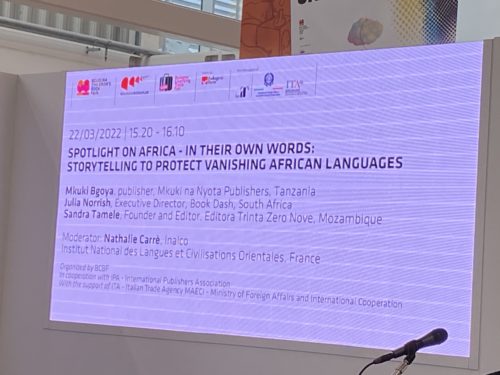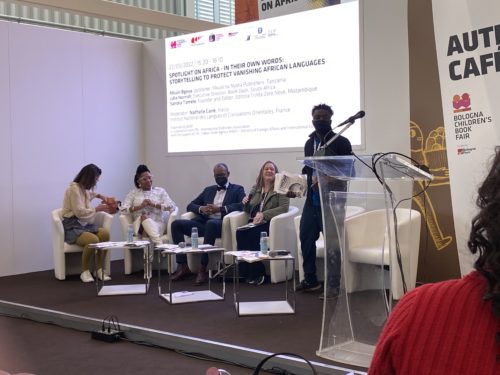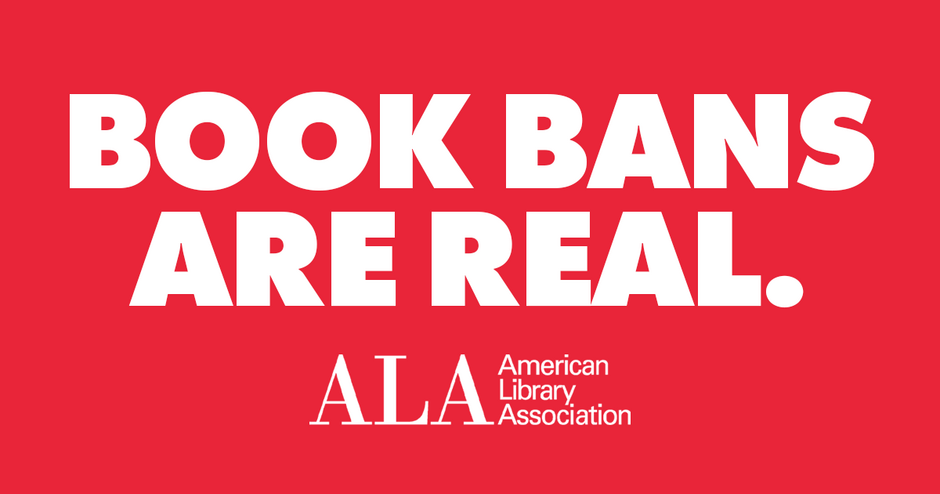Discussion: Spotlight on Africa – In Their Own Words: Storytelling to Protect Vanishing African Languages

The real reason to come to the Bologna Children’s Book Fair is to encounter topics and discussions you simply could not find anywhere else. What better example of this could there be then this panel discussion on attempts of different people in the book industry in different nations in Africa to preserve, protect, and retain languages that might otherwise vanish? To say that I knew nothing of the topic would be an extreme understatement. This was one of the discussions I was most excited to attend.
The panel began with a reading from Ngugi wa Thiong’o’s Decolonizing the Mind: The Politics of Language in African Literature (available in full online here, if you’d like to read it). The selection chosen in particular discusses how the colonial child is made to see the world “and where he stands in it.”
ADVERTISEMENT
ADVERTISEMENT
Moderator Nathalie Carre is from France and Inalco (a.k.a. Institut National des Langues et Civilisations Orientales) where 103 languages are taught, 10 which are from Africa. Nathalie herself is a Swahili teacher.
Each panelist was introduced in turn. There was Julia Norrish from South Africa who works with Book Dash, a “social impact publisher” that aims to give away free books. Their motto: Works to give children access. “Every child should own a hundred books by the age of five”. All told, it publishes in 11 languages from South Africa.

Sandra Tamele is a literary translator and the founder of the independent press Editora Trinta Zero Nove. “Editora Trinta Zero Nove wants to be inclusive by translating and publishing mostly female writers and writers with disabilities or from other minorities in both print and audiobook formats.” The press primarily publishes in the main languages of Mozambique.
And Mkuki Bgoya works with Mkuki na Nyota Publishers in Tanzania. As they say on their site, “We are a Tanzania based publishing house creating educational, scholarly/trade, children’s and art books in Tanzania and Eastern Africa for worldwide distribution.” In fact, last year they won the Bologna Prize for the Best Children’s Publishers of the Year.
Nathalie Carre started off with with this: Africa is a huge continent. There are more than 2,000 languages spoken in Africa with very different ways of surviving. Some are very strong and you can find publications written in those languages, but many don’t have that status. They may be widely spoken but not written, or they may even be endangered. Ten languages are officially endangered right now. How many languages are spoken in your country. How many exist in print? And how many are you publishing?
Please note that these answers are paraphrased and not always verbatim:
Julia Norrish: In South Africa there are eleven official languages. There are about 50 established, however. And four are extinct. Because there are eleven official languages there are publications across all eleven. But picture books? Those are actually rather rare. That’s why Book Dash makes sure to publish them.
Sandra Tamele: In Mozambique 42 languages are spoken, one in sign language, and the official language is Portuguese. In 1975, when the country achieved independence, the government needed a language that would unify the country. That’s why it’s Portuguese, even though only 11% of the country considers it their mother tongue. I am one of the 11%. This language is a legacy of colonialism. We can see that the languages are dying because my generation didn’t get to practice them. I was raised in a multi-lingual household. Maybe that’s why I’m so thirsty about knowing more about the languages of my country. And if I publish in Portuguese then I’m only reaching 11% of the population.
Mkuki Bgoya: There are 120 tribes in Tanzania and Swahili is the official language. It’s widely spoken, but not widely written. Publishing companies don’t publish anywhere near enough books in Swahili. It is in many ways, a minority language in term of publication. Because Tanzania has 120 tribes the official policy was to unify the country under one language. Now many of the other languages in the country have never been written. But what is interesting is almost all those languages have Bible translations. So the irony of colonialism is that there’s at least one document from which to construct the basics of preservation for those languages. That’s the scenario. I publish primarily in Swahili as well as a large dictionary and a small dictionary of two indigenous languages.
Nathalie Carre: How do you bring stories to the children? After all, some of these languages aren’t taught in school.
[At this point Nathalie brought up a very interesting case. An author wanted to publish in a language that is primarily an oral language. After the book came out, he realized how small the population was for this written edition. So, he “re-oralized” it. That is to say, he started reading it on the radio.]
Sandra Tamele: You have to have oral versions of books. How do you write every sound from Bantu languages? There is some degree of consensus but it’s not strong enough. There was once a publisher who challenged the scholars to translate her books into those languages. It’s a steep learning curve, though, so audio is a huge resource. And once you can verbalize your books, you can reach the 37% of the population that’s illiterate. You can make books available as audiobooks for the smaller languages. Also, many children like me grew up in households where stories were told and part of those stories were songs. That’s a very strong part of it. So I may not always remember a story but I remember the song. There’s an oral record to go with the written one. A lot of adults now are going through the de-colonizing process of reassimulating themselves to their mother and father’s languages as adults. If I can bring to my nieces and nephews these language, that’s my goal.

Julia Norrish: If we’re going to see the languages then we need to grow the market and make it clear why there’s value to knowing your cultural heritage. Not everyone grows up with books in the home. Having the books digital and audible is key. You need to expose people so that they realize that they love to read. Seeing your own language in print, when you’re not used to that, can be useful. All the Book Dash titles are published under an open license and in doing that we’re supporting others to use our books. Those in turn can be adapted, turned into YouTube channels, videos, audiobooks, games, animations, etc. Maybe it’s not “pure children’s literature” but it’s a gateway in to seeing your story told. It’s important for publishers to be thinking about that. Not at the cost of the printed book, but in support of them.
Mkuki Bgoya: Here’s one of the ways we can explore children’s books – In the past we’d publish a book in English or Swahili and then we were having a hard time getting our books distributed because Tanzania and most African publishing markets are heavily dominated or tilted towards textbook publishing. So the book chain is adapted and suited to textbook delivery. We were struggling to get children’s books and novels that aren’t just for the curriculum out there. So we had to start our own book shops. And because we were now booksellers, we could get insights into the market of what people wanted. It turned out that parents wanted bilingual books of Swahili AND English. It was a way for a Swahili reading kid to read English or an English reading kid to learn Swahili. It was a two-for-one kind of scenario which was born out of feedback. Often the father and mother in a family are from two different tribes, living in the city, and their kids don’t know either of their languages. They just know English or Swahili. But if they had had a book with their mom’s language, they could pick up on that too. Kids can learn languages more easily than adults after all. It’s still an analog, print innovation but it’s a way of sensitizing parents and children. A lot of parents wish they could give their children the gift of their own languages. How do we make these books usable in their day to day? How do we transition these languages into the digital media? How do you work in TikTok and Instagram? Especially if they don’t have the benefit of their parents or grandparents’ languages.
Nathalie Carre: Multilingual books are interesting. So often these languages are set against one another. Now let’s talk translation.
Sandra Tamele: Words Without Borders has been so useful during the pandemic to keep people connected. If we are dealing with translation, I’m translating from the world into Mozambique not from Mozambique into the world. There’s just one novella written by a trailblazer who is calling to other scholars on figuring out how to write out all the sounds. It’s a shame that there isn’t a network from Mozambique into South Africa. There is a network of translators of African languages and that’s key in terms of tapping into a larger pool of languages. But there is no circulation of literature between the different nations. It’s important to build a network other than the language in English. We have to step out of it and promote dialogue in the African languages.
Mkuki Bgoya: Swahili is a kind of bridge language, made up of Bantu languages. African languages can essentially speak with one another, using Swahili as a bridge. It’s an area where they can find ways to use it to achieve that dialogue. There are a lot of conversations around how they can use Swahili as they translate within the continent. Too often they concentrate too much on translating from Europe into the African continent.
Julia Norrish: It would be a whole different world if we didn’t have to translate from English. For more publishers, the goal is to originate content in African languages. But the confidence of writing a new book in your own language doesn’t exist. Maybe an author spoke it growing up but they lost the nuances. And so if we could promote and value all languages to the degree to where people are feeling confident and passionate and then get to a bridge language, that would be a big step in the right direction.
Nathalie Carre: [Brings up a woman publishing in Malagasy from Madagascar. She is now publishing a wide range of languages, some of them very rare] The kids speak in Malagasy but they ask to write in French. Things change when people read textbooks. But now they’re exploring the national tongue. We want to do books with the whole market. Even if there are just a few people reading this language, we can do this for them and put these book in their libraries. So this is how we reach the people. We want to work with other publishers to help with the different languages too.
Question from the Audience – A publisher in East Africa: The government has for the first time asked for books for the schools. This will be huge in terms of preservation. What are the governments doing in your country? Because it’s really hard to do unless there’s legislative assistance.
Mkuki Bgoya: In Tanzania the policy was to use Swahili as a unifying language. The government has not be forthcoming in terms of promoting indigenous languages, so there is no initiative. We’ve been trying to lobby and convince them of the importance of preserving these languages. The thing about languages is that if you lose one you lose a wealth of wisdom. You lose a lot of physical scientific knowledge. You lose a lot of age old information and learning about the environment, foods, medicinal values, and a lot of inspiration for new materials that you could have been adapting and evolving in terms of Africa futurism, science fiction, etc. So much wealth is lost.
Sandra Tamele: There is a call from the government – so now kids in primary school will be taught in their mother tongue. But it’s only happening in textbooks. They need to move outside of the schools. Often what happens is writers just want to include in their CVs that they wrote for children, so quality is not a big factor.
ADVERTISEMENT
ADVERTISEMENT
Julia Norrish: Eleven languages are acknowledged as official in South Africa. In grade 4 they switch to English as a teaching language and it comes with all sorts of problems. 80% of grade 4 kids can read in their home language. Book Dash is for children under 5. Catch them early! Once a kid’s hooked on something it’s hard to change their mind. We’re also doing an audit of what’s available already, getting that out, and then creating more.
Question From the Audience: Centralizing European languages is a problem. English isn’t the best bridge language. What are we missing when we concentrate European languages as the standard? What else are we missing?
Mkuki Bgoya: When you use English as a bridge language, you are enriching English, perhaps to the detriment of the other languages. We need to start changing that compass and direction. We need to look within the continent to really use a language there as a tool.
Julia Norrish: I translated a book from Arabic and the bridge was an English translator. African names have meanings and stories in themselves but if you translate to English then there’s a westernization that loses that cultural richness. Now sometimes translators can do a literal translation or a poetic version to chose between. But it is crucial to build and increase the pool of translators that can go directly from one language to another without using English as a bridge. It’s a relay. The work is being done, but quality control is a huge issue. We need to try to remove this westernization of African concepts.
Filed under: Bologna Children's Book Fair
About Betsy Bird
Betsy Bird is currently the Collection Development Manager of the Evanston Public Library system and a former Materials Specialist for New York Public Library. She has served on Newbery, written for Horn Book, and has done other lovely little things that she'd love to tell you about but that she's sure you'd find more interesting to hear of in person. Her opinions are her own and do not reflect those of EPL, SLJ, or any of the other acronyms you might be able to name. Follow her on Twitter: @fuseeight.
ADVERTISEMENT
ADVERTISEMENT
SLJ Blog Network
Should I make it holographic? Let’s make it holographic: a JUST ONE WAVE preorder gift for you
Magda, Intergalactic Chef: The Big Tournament | Exclusive Preview
Fifteen early Mock Newbery 2026 Contenders
When Book Bans are a Form of Discrimination, What is the Path to Justice?
RA Tool of the Week: Inside Out Inspired Emotions, but Make it YA Books
ADVERTISEMENT





